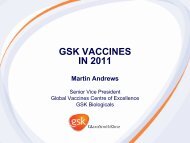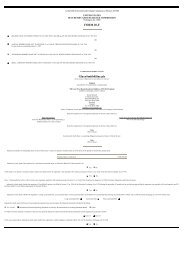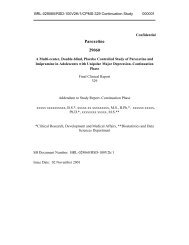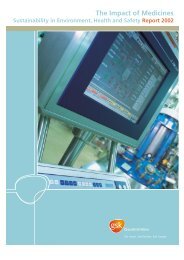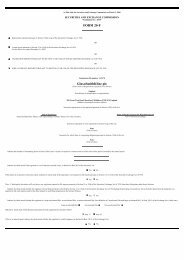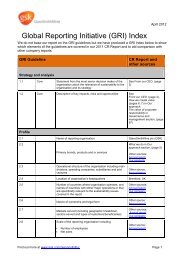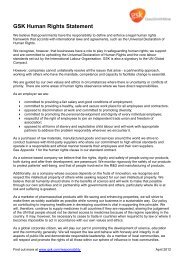GSK Annual Report 2002
GSK Annual Report 2002
GSK Annual Report 2002
You also want an ePaper? Increase the reach of your titles
YUMPU automatically turns print PDFs into web optimized ePapers that Google loves.
2 Accounting policies continued<br />
Stocks<br />
Stocks are included in the financial statements at the lower of cost<br />
(including manufacturing overheads, where appropriate) and net<br />
realisable value. Cost is generally determined on a first in, first out<br />
basis.<br />
Taxation<br />
The Group accounts for taxation which is deferred or accelerated<br />
by reason of timing differences which have originated but not<br />
reversed by the balance sheet date. Deferred tax assets are only<br />
recognised to the extent that they are considered recoverable<br />
against future taxable profits. Deferred tax on the retained earnings<br />
of overseas subsidiaries is only provided when there is a binding<br />
commitment to distribute past earnings in future periods.<br />
Deferred tax is measured at the average tax rates that are expected<br />
to apply in the periods in which the timing differences are expected<br />
to reverse. Deferred tax liabilities and assets are not discounted.<br />
Current asset investments<br />
Current asset investments are stated at the lower of cost and net<br />
realisable value.<br />
In the case of securities acquired at a significant premium or<br />
discount to maturity value, and intended to be held to redemption,<br />
cost is adjusted to amortise the premium or discount over the life<br />
to maturity of the security. Floating rate bonds are stated at cost.<br />
Interest income is taken to the profit and loss account on a<br />
receivable basis.<br />
Equity investments are included as current assets when regarded<br />
as available for sale.<br />
Derivative financial instruments<br />
The Group does not hold or issue derivative financial instruments<br />
for trading purposes.<br />
Derivative financial instruments are used to manage exposure to<br />
market risks from treasury operations. The principal derivative<br />
instruments are currency swaps, forward exchange contracts and<br />
interest rate swaps. The derivative contracts are treated from<br />
inception as an economic hedge of the underlying financial<br />
instrument, with matching accounting treatment and cash flows.<br />
The derivative contracts have high correlation with the specific<br />
financial instrument being hedged both at inception and<br />
throughout the hedge period. Derivative instruments no longer<br />
designated as hedges are restated at market value and any future<br />
changes in value are taken directly to the profit and loss account.<br />
Currency swaps and forward exchange contracts used to fix the<br />
value of the related asset or liability in the contract currency and<br />
at the contract rate are accrued to the profit and loss account<br />
over the life of the contract. Gains and losses on foreign exchange<br />
contracts designated as hedges of forecast foreign exchange<br />
transactions are deferred and included in the measurement of the<br />
related foreign currency transactions in the period they occur.<br />
Gains and losses on balance sheet hedges are accrued and are<br />
taken directly to reserves, except that forward premium/discounts<br />
are recognised as interest over the life of the contracts.<br />
Interest differentials under interest swap agreements are recognised<br />
in the profit and loss account by adjustment of interest expense<br />
over the life of the agreement.<br />
Notes to the financial statements GlaxoSmithKline 85<br />
Debt instruments<br />
Debt instruments are stated at the amount of net proceeds<br />
adjusted to amortise the issue cost of debt evenly over the term<br />
of the debt.<br />
3 New accounting policies and future requirements<br />
The Group has implemented Financial <strong>Report</strong>ing Standard 19<br />
‘Deferred Tax’ in <strong>2002</strong> which requires deferred tax to be accounted<br />
for on a full provision basis, rather than a partial provision basis as<br />
before. Comparative information has been restated as necessary.<br />
The effect in 2001 is to increase the business performance tax<br />
charge by £8 million (2000 – £43 million) and the overall tax charge<br />
by £6 million (2000 – £48 million). The net deferred tax asset at<br />
31st December 2001 has been reduced by £127 million.<br />
In June <strong>2002</strong>, the Council of the European Union adopted a<br />
Regulation requiring listed companies in its Member States to<br />
prepare their consolidated financial statements in accordance with<br />
international accounting standards from 2005. The Group has<br />
initiated a project to plan for and implement the conversion from<br />
UK GAAP to International Financial <strong>Report</strong>ing Standards (IFRSs).<br />
The first <strong>Annual</strong> <strong>Report</strong> prepared under IFRSs will be that for the<br />
year ending 31st December 2005. The first financial results<br />
announcement prepared in accordance with IFRSs will be that for<br />
the first quarter of 2005.<br />
4 Exchange rates<br />
The Group uses the average of exchange rates prevailing during<br />
the period to translate the results and cash flows of overseas Group<br />
subsidiary, joint venture and associated undertakings into sterling<br />
and period end rates to translate the net assets of those<br />
undertakings. The currencies which most influence these<br />
translations, and the relevant exchange rates, were:<br />
<strong>2002</strong> 2001 2000<br />
Average rates:<br />
£/US$ 1.50 1.44 1.52<br />
£/Euro 1.59 1.61 1.64<br />
£/Yen 188.00 175.00 163.46<br />
Period end rates:<br />
£/US$ 1.61 1.45 1.49<br />
£/Euro 1.54 1.64 1.61<br />
£/Yen 192.00 190.00 171.00<br />
5 Merger of Glaxo Wellcome and SmithKline Beecham<br />
The combination of Glaxo Wellcome plc and SmithKline Beecham plc<br />
was treated as a merger at 27th December 2000 under UK GAAP.<br />
Under merger accounting, the shares issued by GlaxoSmithKline plc<br />
to acquire Glaxo Wellcome and SmithKline Beecham were accounted<br />
for at par and no share premium arose; the shares acquired by<br />
GlaxoSmithKline in Glaxo Wellcome and SmithKline Beecham were<br />
similarly accounted for at the nominal value of the shares issued.<br />
In the consolidated Financial statements of GlaxoSmithKline, the<br />
results and net assets of Glaxo Wellcome and SmithKline Beecham<br />
were combined, at their book amounts, subject to alignment<br />
adjustments.<br />
In view of the proximity of the merger date to the financial year end<br />
date, and the relative insignificance of any business activity between<br />
27th December 2000 and 31st December 2000, the accounting<br />
date of the merger was for practical purposes taken as<br />
31st December 2000. The whole of the profit for the financial year<br />
2000 of each of Glaxo Wellcome plc and SmithKline Beecham plc<br />
was deemed to relate to the period prior to the merger date.



